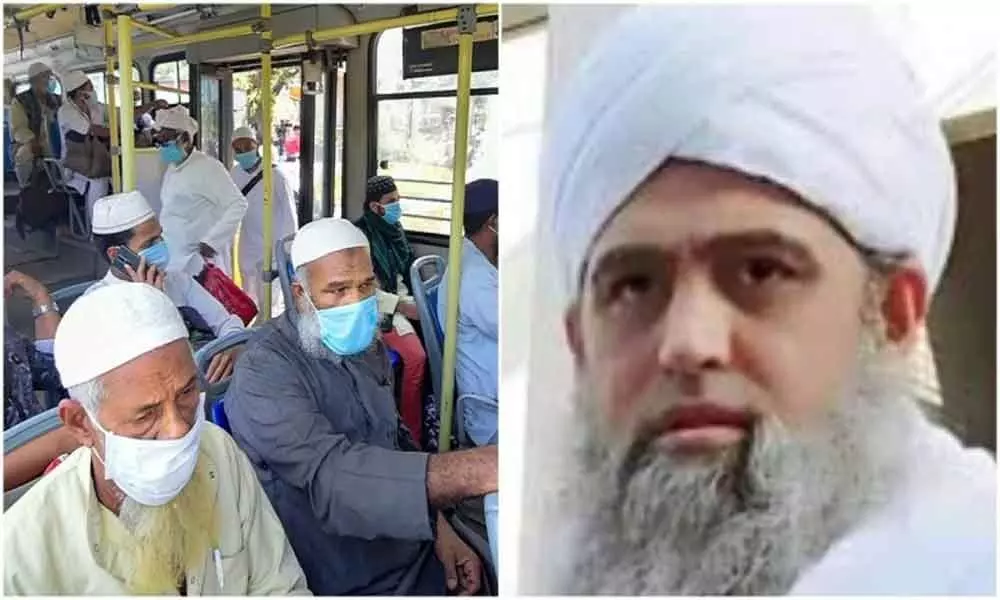Live
- All you need to know about PAN 2.0
- Akasa Air redefines travel experience with industry-first offerings
- MP: Residents stage protests against liquor shop in Indore
- Telugu Actor Shri Tej Booked for Alleged Cheating and False Promise of Marriage in Live-in Relationship
- Toyota Kirloskar Motor Celebrates 1 Lakh Urban Cruiser Hyryder on Indian Road
- MLS: New York City FC part ways with head coach Nick Cushing
- Delhi CM says Centre cutting AAP voters’ names from rolls, BJP hits back
- Hyderabad Metro Rail Phase-II Works to Begin in Old City in January 2025
- Odisha: 668 persons killed in human-elephant conflicts in last three years
- DEFENDER JOURNEYS: TO EMBARK ON ITS THIRD EDITION FROM NOVEMBER 2024
Just In

In the wake of coronavirus outbreak across the country the organisation, Tableeghi Jamaat which held the religious gathering or Ijtemah, in Nizamuddin area of the National capital from March 1 two March 15, has hit the headlines raising many questions.
In the wake of coronavirus outbreak across the country the organisation, Tableeghi Jamaat which held the religious gathering or Ijtemah, in Nizamuddin area of the National capital from March 1 two March 15, has hit the headlines raising many questions. Tableeghi Jamaat has a pan-India missionary network and organises large congregations each year.
With the outbreak of coronavirus, the lockdown and the presence of more than 2000 people in the Markaz or Centre of the Tableeghi Jamaat, the authorities moved in to clear the premises. More than 2300 people were evacuated from the Jamaat headquarters in Nizamuddin on the intervening night of Tuesday and Wednesday and moved to different hospitals in Delhi for testing.
Soon reports of those who attended the at Nizamuddin Ijtemah, came in from various parts of the country. In the two Telugu states alone, close to 2000 people were reported to have attended the religious event in the national capital. 1100 people in Telangana have been tracked down and 160 are yet to be traced, according to the state Home Minister. Six deaths have been reported from among those who attended the Delhi religious congregation. 1500 people are reported to have attended the congregation in Nizamuddin from the southern state of Tamil Nadu and some of them still remain to be traced by the state government. 40 people from the southernmost state of Kerala are said to have attended the Nizamuddin congregation and have been traced by state government authorities.
Who is Maulana Saad?
The Jamaat is headed by Maulana Saad Kandhalvi, a 55 year-old cleric who is now reportedly on the run since March 28. The Crime Branch team of Delhi police has lodged an FIR under The Epidemic Diseases Act 1897 and other provisions of the law, against Maulana Saad and others for gross negligence. A controversial audio clip reportedly that of Maulana Saad in which he is heard telling people not to practise social distancing, among other things, has also gone viral.
Born in the national capital on May 10, 1965 Maulana Saad is the great-grandson of Mohammed Ilyas, the founder of Tableeghi Jamaat. The organisation itself is an offshoot of the Deobandi school of Islamic and beliefs and way of life. Maulana Saad's full name is Mohammed Saad Khandalvi.
Maulana Saad obtained a degree of Aalim from a seminary or madrassa named Kaashif-ul-Uloom situated in the Nizamuddin area of the capital.
Maulana Saad declared himself the sole Ameer or leader of the Jamaat in India. He has courted controversy in the past and has had run-ins with another group of the Jamaat led by Maulana Zuhair ul Hassan. The Deoband seminary is also reported to have frowned upon many of Maulana Saad's statements in the past. The Governor of Kerala, Arif Mohammed Khan in his interaction with a prominent TV network, has criticised Maulana Saad for speeches reportedly made by him in which asks people to defy government orders and keep mosques open and attend their prayers.

© 2024 Hyderabad Media House Limited/The Hans India. All rights reserved. Powered by hocalwire.com







